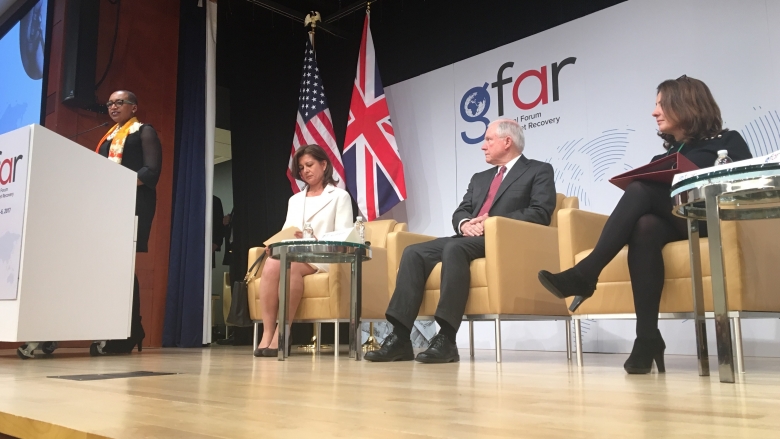Your Excellencies,
Mr. Jeff Sessions, Attorney General of the United States; Baroness Williams of Trafford, Minister for Countering Extremism at the UK Home Office,
Distinguished guests and participants.
I am extremely pleased and honored to welcome you to the World Bank Group for the inaugural meeting of the Global Forum on Asset Recovery.
Together with the United Nations Office on Drugs and Crime, our partner in the Stolen Asset Recovery Initiative, the World Bank is pleased to provide a platform for countries to further the cause of the fight against corruption in general, and the recovery of stolen assets, in particular.
We have been fighting corruption for a long time. It is over 20 years ago that James Wolfensohn, former President of the World Bank Group, delivered what has come to be known as the “Cancer of Corruption” speech, highlighting the devastating impact of corruption on the poor and how it affects every aspect of development. We have made a lot of progress since then. But, as more and more instances of corruption come to light, we know that there is much more to do.
If we are to make sustained progress in the pursuit of the World Bank Group’s twin goals -- to end extreme poverty and boost shared prosperity -- we must double our efforts in the fight against corruption.
The focus of this Global Forum on Asset Recovery is to bring law enforcement and development specialists together to combat corruption more effectively. This provides the opportunity both to lay out the case against corruption and to put words into action by furthering the anti-corruption efforts of our focus countries: Nigeria, Sri Lanka, Tunisia and Ukraine. The Forum seeks to ensure that public resources stolen from these countries are ultimately returned to the public purse to support public goods. Public resources should benefit all, not just the few – this is a key aspect of shared prosperity.
We know corruption is an issue in all countries: those where bribes are paid, those where its proceeds are laundered, and those on the receiving end. It takes two to tango, but corruption is rarely only a two-person dance. While the focus is often on the giver and the taker in corrupt transactions – considerably less attention is payed to those who enable corruption more broadly. This is a problem the world over.
Breaking these alliances of corrupt officials and their enablers, and recovering the proceeds of corruption, requires strong partnership and political will in different quarters. We also hope that this event will send a strong message on the importance of independent institutions -- from investigative and prosecutorial bodies to the judiciary -- in the fight against corruption.
We must also not forget that as we speak institutions that play a key role in ultimately recovering stolen assets are under pressure in many countries. We must show them unwavering support to accomplish their mission. We know that successful anti-corruption efforts must feature a broad coalition of leaders across borders, as well as partners both inside and outside of government in different countries working together.
That is why the participants of the 2016 Anti-Corruption Summit in London agreed to convene this Forum. We are happy to welcome not only the focus countries— Nigeria, Sri Lanka, Tunisia and Ukraine—and the US and the UK, the co-hosts of this Global Forum, but also representatives from financial centers and jurisdictions, as well as civil society organizations represented today.
This Global Forum on Asset Recovery is a milestone in a journey that started some years ago. It draws on lessons learned from previous asset recovery forums focusing on the Middle East and on Ukraine, and brings together the political and the technical; coming from government and civil society; from countries which have lost their assets and from financial centers. This is not a conference for talking but a forum for doing—to further efforts to recoup stolen assets and deliver results for citizens.
We sincerely believe that the Forum will catalyze concrete steps to further asset recovery efforts: by making immediate progress in individual cases, by improving technical capacity with a longer-term view, and by laying the foundations for new relations between practitioners in countries to facilitate future asset recovery efforts. Asset recovery is a long-term effort that requires tenacity and creativity to be successful.
The Memorandum of Understanding that is about to be signed today between Switzerland, Nigeria and the World Bank is a case in point. We are convinced that collectively we have the expertise and persistence to bring to justice those who did wrong and to ensure the repatriation of stolen assets, while fully respecting due process and the rule of law.
Where there is a will, there is a way. For our part, we are committed to contributing to this process through the World Bank/UNODC StAR Initiative.
Let me finish by thanking again the co-hosts, the Governments of the United States and the United Kingdom for convening this Forum, and the four focus countries, Nigeria, Sri Lanka, Tunisia and Ukraine, for their dedication and hard work in the run-up to this Forum. To all participants, from governments, partner organizations and civil society organizations, we wish you all success in the days and years ahead and commend you for your efforts.
Thank you.

